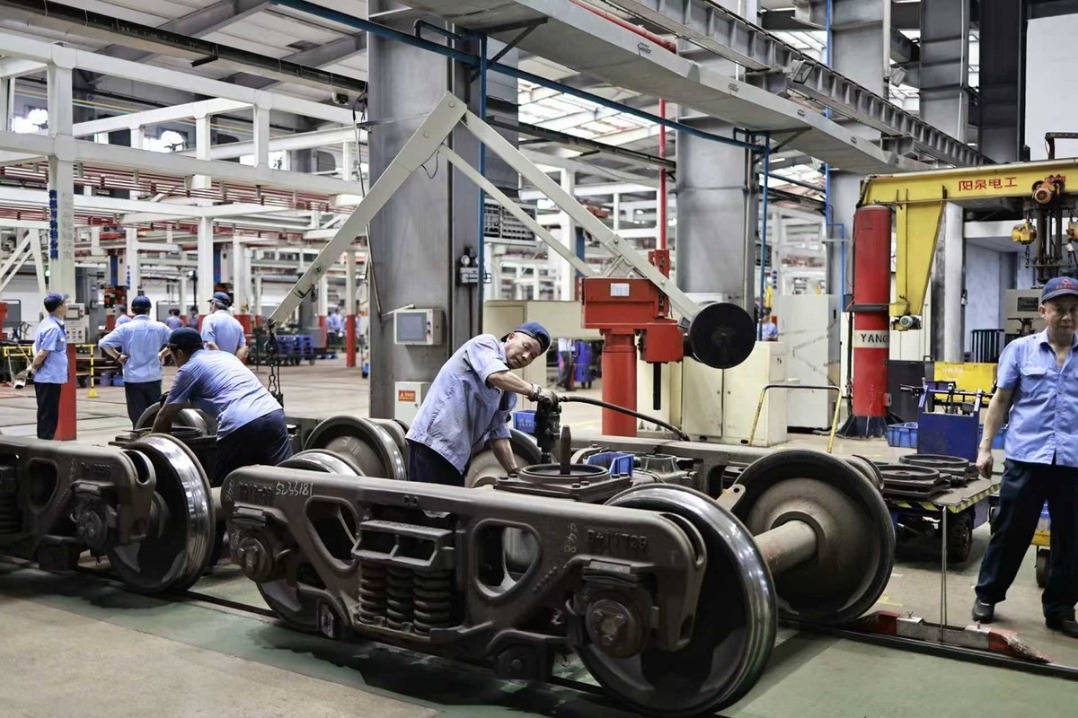Policies help ease problems of migrant kids

The eastern province of Zhejiang has channeled greater efforts and resources to support the well-being of migrant children, and has taken several explorative steps to ease the children's problems of education, healthcare and public services by relaxing hukou — the permanent household registration — restrictions in recent years.
Linli community in Baiyang subdistrict of Hangzhou, Zhejiang province, has operated a public kindergarten for migrant children since November 2022, where the migrant workers covered by the national social insurance program can apply to send their children to the kindergarten without hukou restrictions.
Zhang Minhua, Party secretary of the Linli community, said that the community, located in the city's Qiantang district of industrial zones, has most of the residents being migrant workers who face problems registering their households in the city due to hukou restrictions, thus their children have difficulty of getting enrolled in public schools.
She said that the establishment of the kindergarten in 2022 is based on the needs of migrant families, and is supported by the city's policy of embedding child-nursing houses and kindergartens in industrial zones unveiled in 2021.
She said the kindergarten, taking an indoor space of 2,300 square meters and outdoors of 600 square meters, has four classes including daycare, junior, middle and senior classes with currently 102 children at the kindergarten.
"The kindergarten offers quite good teaching resources with affordable prices, which is around 980 yuan ($136) per month for daycare classes and 580 yuan a month for junior, middle and senior classes. The daily meal expense is 12 yuan including lunch and desserts," she said.
Zhang said that the community has also organized daycare summer camps for migrant children over the past 14 years, where the children get engaged in lectures, homework tutoring services and tours to nearby companies and plants during their summer vacations from July to August. Over 1,300 children have joined the program during the period.
"The summer camp program is free of charge and parents only have to pay 100 yuan for the children's insurance fees, and the program is open to the migrant children from Monday to Friday during the two months of the summer holiday. We are also pleased to see some of the grown-up migrant children return to the summer camp for voluntary services," she said, adding that more volunteers from social organizations, companies and government bodies have joined the program in recent years.
With the migrant population reaching about 230,000, roughly three times of the local residents, the Jiubao subdistrict in Hangzhou has attached increasing attention to the well-being of migrant children, whose population is about 7,800 as of November last year.
The subdistrict started a program called "shared grandma" in March, under which the retired are encouraged to pick up children after school around 3 pm, the time the children's parents are still working, and send them to public service facilities at residential communities like libraries for leisure.
"The program is under trial period at two communities in the subdistrict — one is an urban community and the other is mostly self-built houses and rented by migrant workers. We've encouraged house owners, who are mostly retired and living by collecting rents, to help pick up children and we now have about 35 voluntary grandmas and grandpas at the self-built houses community," said Zhu Hongmei, an official from the Jiubao subdistrict office. She added that the elderly volunteers are required to be under 70 years old in healthy condition and with kindness.
She said that through the voluntary program, many migrant workers and children have felt the warmth and kindness of local residents rather than being insecure or helpless, and have established closer relationships with the local residents.
According to her, the subdistrict started organizing daycare summer camps in 2009 for migrant children. From the spring semester this year, social workers have started visiting schools with over 60 percent of students being migrant children, to give the children emotional support and help them solve family relationship problems.
"It's very meaningful to pay attention to and take care of migrant children, though the process is difficult," said Zhu.
According to the seventh national census conducted in 2020, China has about 298 million children aged between 0 and 17 years old, and the number of migrant children is around 71 million.
In August last year, about 21 central ministries and departments jointly launched an action plan on intensifying care and protection for migrant children. The plan set the target of optimizing policies and working mechanisms concerning migrant children's well-being by 2026 and letting them get more balanced and equal benefits.
It also set the goal that by 2035, migrant children will get higher-quality public services and well-secured rights for comprehensive physical and psychological development.
- Grand Bazaar enters peak tourism season in China's Xinjiang
- CCG warns the Philippines to stop provocations in South China Sea
- 7 killed, 9 missing in Qinghai bridge construction accident
- Central delegation presents gifts to people in Xizang
- Month-long Macao intl fireworks contest to commence in September
- Flash flood in Inner Mongolia claims 12 lives, 1 survives




































